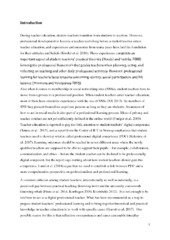| dc.contributor.author | Helleve, Ingrid | |
| dc.contributor.author | Almås, Aslaug Grov | |
| dc.contributor.author | Bjørkelo, Brita | |
| dc.date.accessioned | 2020-05-12T13:54:17Z | |
| dc.date.available | 2020-05-12T13:54:17Z | |
| dc.date.issued | 2020 | |
| dc.Published | Helleve I, Almås AG, Bjørkelo B. Becoming a professional digital competent teacher. Professional Development in Education. 2020;46(2):324-336 | eng |
| dc.identifier.issn | 1941-5265 | |
| dc.identifier.issn | 1941-5257 | |
| dc.identifier.uri | https://hdl.handle.net/1956/22207 | |
| dc.description.abstract | The aim of this Norwegian study is to focus on challenges and possibilities concerning professional digital competence (PDC) for teacher education encountering students in transition between the position as private and professionals. Students need to gain a self-understanding of who they are and how to react in a profession where there few correct answers- A report from the Norwegian Center of ICT underlines that student teachers should develop PDC. The report says nothing about how this competence should be attained. Working with cases has proved to be a possible way to prepare for future work as teachers. Included in the interviews with focus on previous experiences, are cases with ethical dilemmas concerning teachers’ use of SNS. Findings show that SNS is used for private purposes. Students have experienced negative messages posted in SNS. They have little experience with using SNS for pedagogical purposes and they do not want to be friends with their pupils. Reflection on cases including ethical dilemmas is regarded as a useful way to gain a self-understanding as professional, digital competent teachers. The conclusion is that teacher education should create possibilities for reflection based on personal experiences and cases including ethical dilemmas connected to SNS. | en_US |
| dc.language.iso | eng | eng |
| dc.publisher | Taylor & Francis | eng |
| dc.title | Becoming a professional digital competent teacher | eng |
| dc.type | Peer reviewed | |
| dc.type | Journal article | |
| dc.date.updated | 2020-01-22T12:55:16Z | |
| dc.description.version | acceptedVersion | |
| dc.rights.holder | Copyright 2019 International Professional Development Association (IPDA) | eng |
| dc.identifier.doi | https://doi.org/10.1080/19415257.2019.1585381 | |
| dc.identifier.cristin | 1685590 | |
| dc.source.journal | Professional Development in Education | |
